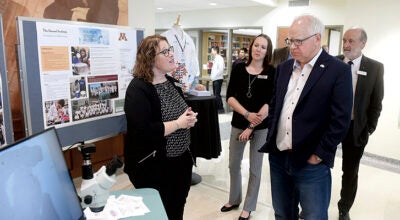Minn. officials scramble to blunt big premium hikes
Published 8:00 am Friday, October 28, 2016
ST. PAUL — Minnesota Gov. Mark Dayton unveiled a plan Thursday to help thousands of residents buying health insurance on their own amid looming spikes in premium costs, setting off legislative jostling over how to help before some of the largest hikes in the nation take effect in January.
Republicans and Democrats are scrambling to help Minnesota residents who make too much money to qualify for federal subsidies. Two weeks ago, Dayton turned heads when he said the Affordable Care Act was no longer affordable for many people.
Minnesota is seeing the fourth largest increases in the nation for the plans ushered in by President Barack Obama’s health care law, with rate hikes ranging from 50 percent to 67 percent for plans sold in the individual market.
Dayton’s plan would cover 25 percent of those health insurance costs by using $313 million of a budget surplus to offer rebates. The rebates, administered by health insurers, would reduce the average premium increase of 55 percent down to 16 percent, according to administration estimates.
Republicans who control the state House have offered up tax credits to offset the increases, along with other policies to expand health insurance access in rural Minnesota.
No matter the approach, any such plan would require legislative approval. Dayton said he wants to call a special session soon after Election Day.
“People need to know where they stand,” the Democratic governor said.
The state’s financial help would only be available to people making too much money to get federal support. But unlike federal tax credits, the state rebate wouldn’t vary based upon income — a single person making $48,000 annually would get the same rebate as someone who earns $1 million.
Dayton said he would prefer to tie the rebate to income, but he said the state didn’t have enough time to structure a program in time for January.
Rep. Greg Davids, a top Republican in the Minnesota House, credited the governor for putting a plan on the table, but he said lawmakers also need to boost health insurance access. Davids said he fears that many people won’t be able to purchase health coverage, with Blue Cross Blue Shield of Minnesota scheduled to exit the market in 2017 and several insurers limiting their enrollment.
“This has to be our top priority. We have to leave our party designations at the door,” Davids said.





